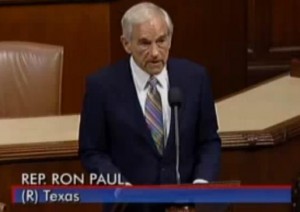‘Audit the Fed’ bill passes Committee with no vocal opposition
Texas Congressman Ron Paul’s signature legislation that he has been fighting for for three decades was unanimously passed in the the U.S. House of Representatives Oversight and Government Reform Committee Wednesday.
The bill, H.R. 459, passed the House Oversight Committee this morning on a voice vote, with no vocal opposition. House Republican leaders have said that they plan on addressing the legislation on the floor sometime next month.
The Federal Reserve Transparency Act of 2011 would eliminate some of the existing restrictions on Federal Reserve audits.
The bill would eliminate certain restrictions that now exist on any audits done on the Federal Reserve from 31 U.S.C. 714, such as:
Audits of the Board and Federal reserve banks may not include—
(1) transactions for or with a foreign central bank, government of a foreign country, or nonprivate international financing organization;
(2) deliberations, decisions, or actions on monetary policy matters, including discount window operations, reserves of member banks, securities credit, interest on deposits, and open market operations;
(3) transactions made under the direction of the Federal Open Market Committee; or
(4) a part of a discussion or communication among or between members of the Board and officers and employees of the Federal Reserve System related to clauses (1)–(3) of this subsection.
What was once just a “crazy idea” has gained traction and support in light of the financial meltdown just a few short years ago.
Ron Paul released the following statement on the vote:
“I am very happy that the House Committee on Oversight and Government Reform today passed H.R. 459. The bill passed unanimously by voice vote, with all of its strong audit provisions intact. It is time for the Federal Reserve to face a thorough audit of its monetary policy and lending operations. The Fed’s purchases of dubious assets from favored Wall Street institutions; its lending of hundreds of billions of dollars to foreign governments and central banks; and the prospect of further quantitative easing and European bailouts underscore the critical need for transparency. I am deeply appreciative of the overwhelming support this legislation has received from my colleagues in the House, especially today from the Oversight Committee. I look forward to seeing my Audit the Fed legislation passed by a bipartisan majority of Congress next month.”
Paul’s son, Kentucky Senator Rand Paul, who introduced similar legislation in the Senate said:
“Today, I applaud the unanimous passage of Audit the Fed out of committee and commend House leadership for promising a vote on Audit the Fed next month,” Sen. Paul said. “It is important that we get our economy growing again through savings and investment, not more debt and deficit spending. But we can’t turn the economy around until we fix the root of the problem: an unaccountable Federal Reserve. A complete and thorough audit of the Fed will finally allow the American people to know exactly how their money is being spent by Washington.”
“I have introduced similar legislation in the Senate and will continue to fight on the frontlines of this battle to get Audit the Fed passed through Congress.”
Even long time ally in the Congress, Ohio Democratic Rep. Dennis Kucinich thanked Paul for his “diligence” in advocating for a bill that would give the Government Accountability Office the authority to fully audit the Federal Reserve, adding that it is “baloney” to suggest Congress cannot “touch the Fed.”
Kucinich said in a statement Wednesday:
“Today, as this nation continues to deal with the effects of the worst financial crisis since the Great Depression, we know for a fact that trillions were created by the Fed during the financial crisis, largely for the benefit of the biggest financial institutions, which brought us to crisis in the first place. Yet the Fed’s monetary policy operations remain largely exempt from scrutiny.
“When Congress created the Fed in 1913, Congress delegated specific tasks to it, and Congress remains constitutionally-obligated to conduct oversight over the Fed as a result. The Fed should not be permitted to operate in the dark without oversight by Congress and accountability to the people.”
“I also want to go on the record thanking Representative Ron Paul for his work on the larger issue here with respect to the Federal Reserve. We wouldn’t be at this moment except for his diligence. I was proud to work with him in the early stages of this bill.”















